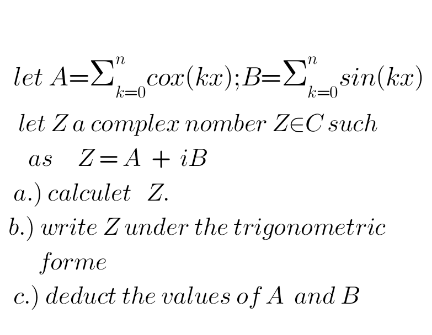
Question and Answers Forum
Question Number 164071 by kdaramaths last updated on 13/Jan/22

Answered by Ar Brandon last updated on 13/Jan/22
![Z=Σ_(k=0) ^n e^(ikx) =((1−e^(i(n+1)x) )/(1−e^(ix) )) =((e^(i((((n+1)x)/2))) (e^(−i((((n+1)x)/2))) −e^(i((((n+1)x)/2))) ))/(e^(i(x/2)) (e^(−i(x/2)) −e^(i(x/2)) ))) =e^(i((nx)/2)) ((sin((((n+1)x)/2)))/(sin((x/2))))=((sin((((n+1)x)/2)))/(sin(x/2)))[cos((nx)/2)+isin((nx)/2)] Σ_(k=0) ^n sinkx=ImΣ_(k=0) ^n e^(ix) =((sin((((n+1)x)/2))sin(((nx)/2)))/(sin((x/2)))) =((4sin((((n+1)x)/2))sin(((nx)/2))sin((x/2)))/(4sin^2 (x/2))) =((2sin((((n+1)x)/2))[cos((((n−1)x)/2))−cos((((n+1)x)/2))])/(2(1−cosx))) =(((sin(nx)+sinx)−(sin((n+1)x))/(2−2cosx)) =((sin((n+1)x)−sin(nx)−sinx)/(2cosx−2))](Q164074.png)
| ||
Question and Answers Forum | ||
Question Number 164071 by kdaramaths last updated on 13/Jan/22 | ||
 | ||
Answered by Ar Brandon last updated on 13/Jan/22 | ||
![Z=Σ_(k=0) ^n e^(ikx) =((1−e^(i(n+1)x) )/(1−e^(ix) )) =((e^(i((((n+1)x)/2))) (e^(−i((((n+1)x)/2))) −e^(i((((n+1)x)/2))) ))/(e^(i(x/2)) (e^(−i(x/2)) −e^(i(x/2)) ))) =e^(i((nx)/2)) ((sin((((n+1)x)/2)))/(sin((x/2))))=((sin((((n+1)x)/2)))/(sin(x/2)))[cos((nx)/2)+isin((nx)/2)] Σ_(k=0) ^n sinkx=ImΣ_(k=0) ^n e^(ix) =((sin((((n+1)x)/2))sin(((nx)/2)))/(sin((x/2)))) =((4sin((((n+1)x)/2))sin(((nx)/2))sin((x/2)))/(4sin^2 (x/2))) =((2sin((((n+1)x)/2))[cos((((n−1)x)/2))−cos((((n+1)x)/2))])/(2(1−cosx))) =(((sin(nx)+sinx)−(sin((n+1)x))/(2−2cosx)) =((sin((n+1)x)−sin(nx)−sinx)/(2cosx−2))](Q164074.png) | ||
| ||